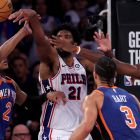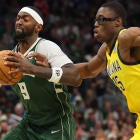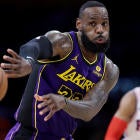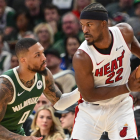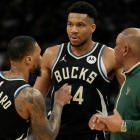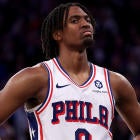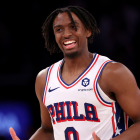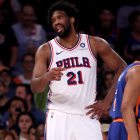No team had a worse offseason than the Oklahoma City Thunder. They are the only franchise that lost a franchise player in his prime for nothing. Instead of being a championship contender, Oklahoma City is now seen as a question mark. Unlike other teams that have watched a superstar walk recently, though, the Thunder have positioned themselves to remain relevant.
Here are five reasons why they won't collapse:
1. We've seen them without Durant before
In 2014-15, Durant missed 27 games and the Thunder went 45-37. They were about .500 without him, and it's worth noting that Russell Westbrook and Serge Ibaka missed a significant portion of the regular season, too. When Westbrook was in the lineup without Durant, they went 22-17, and he averaged an absurd 31.4 points, 9.2 assists and 7.9 rebounds, as pointed out by ESPN's Kevin Pelton. This is why he is a popular pick for MVP.
The lesson: Oklahoma City won't simply fall apart because of Durant's absence. Two years ago, it would have made the playoffs in a brutal Western Conference if not for Anthony Davis' miracle 3-pointer one Friday night in February.
That version of the Thunder was a good offensive team and a decent defensive one. That version of Westbrook was otherworldly. It was the best season of his career, and that's not just because his per-game numbers were inflated. Then-coach Scott Brooks empowered him to take complete control of the offense, and no one could slow him down. Westbrook had the second-highest usage rate of all-time and he didn't sacrifice efficiency because he cut down on turnovers and got to the free throw line like crazy.
That season showed everybody that Westbrook is more than capable of being OKC's leading man. Equally important: his supporting cast is much better now.
2. Adams' ascension
The playoffs were Adams' big coming-out party, but he'd been quietly emerging as a force for a while. Still just 23 years old, the 7-footer is already one of the best finishers in the league. He's also a solid and mobile positional defender, with enough athleticism to stick with smaller players on the perimeter when needed. He has happily filled an important role for the Thunder since his rookie year.
After Adams' work against the Spurs and Warriors in the playoffs, even the most casual NBA observers are now familiar with his game. His potential, though, still might not be fully appreciated. Last season, Adams posted a minuscule 12.6 percent usage rate -- with two phenomenal playmakers, Oklahoma City did not need him to do much on offense other than set screens, score around the basket and battle for rebounds. Now that Durant is gone, Adams will have the opportunity to do more.
No one should expect the Thunder to force-feed Adams the ball on the block over and over again like he's Hakeem Olajuwon. They should involve him more in the offense, though, and allow him to be more of a facilitator. He's ready for the responsibility.

3. Oladipo's opportunity
After three seasons in relative obscurity with the rebuilding Orlando Magic, Victor Oladipo has been rescued by a winning team. He will immediately assume a starting role and become Oklahoma City's secondary playmaker. When he thrives, it shouldn't be a surprise.
Remember how big of a deal it was when Dion Waiters played pretty good defense and made some 3-pointers in the playoffs? The Thunder have been looking for a reliable shooting guard since the James Harden trade. They've never had a defender as good as Oladipo at the position, and he'll bring offense, too. He shot a career-high 34.8 percent from 3-point range last season, and he should get more open looks with Westbrook driving and drawing multiple defenders.
Oladipo, too, is gifted when it comes to getting into the paint. Few teams will have a backcourt as athletic as this, constantly putting the pressure on defenses and pushing the ball in transition. Westbrook will love playing with him.
4. Suddenly, there is depth here
Oklahoma City's front office has taken some criticism over the years for the way it built teams around Durant and Westbrook. Two years ago, a 39-year-old Derek Fisher found himself playing major minutes in the conference finals. General manager Sam Presti has acquired a bunch of solid role players since then, though, and now the Thunder's depth should be considered a strength.
At the most important time of the year, Andre Roberson showed that he can play power forward, where his lack of offense is less of a liability. Enes Kanter was crucial when OKC upset San Antonio. Cameron Payne could quickly become one of the better backup point guards in the league if he improves defensively. Ersan Ilyasova will space the floor at the 4, unless promising rookie Domantas Sabonis steals his playing time. Spanish shooting guard Alex Abrines will compete with marksman Anthony Morrow for minutes, too. Nick Collison is still around, and Josh Huestis and Kyle Singler both have the potential to carve out a spot in the rotation if they can manage to make jumpers occasionally.
Just like last year, coach Billy Donovan will probably experiment with a bunch of different rotations to figure out what works and what doesn't. The good news is, despite Durant's departure, Donovan has options.

5. No identity issues
The Thunder found a winning formula in the playoffs, and they don't need to abandon it. The plan: play disruptive defense, switch with abandon and run like hell. This plays to Westbrook's strengths, and it should minimize the inevitable offensive drop-off.
As important to Durant's quickness, length and rim protection was to Oklahoma City's defense, it can approximate what he did with Oladipo as the stopper and Adams as the anchor. Picture a Payne-Westbrook-Oladipo-Robertson-Adams lineup, or put the versatile Huestis in Payne's place. These groups can play the same style, even if wins don't come as easily or often as they did before.














